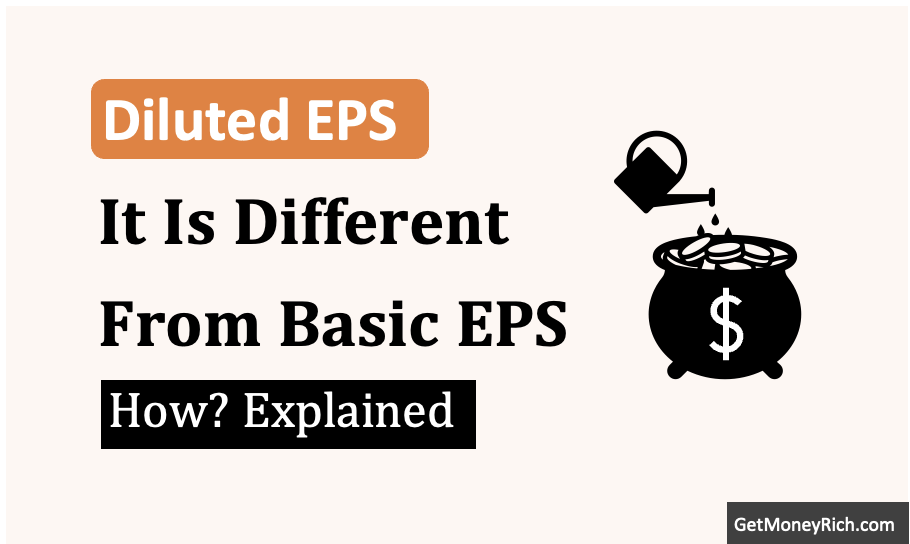We often hear about a company’s performance through a simple number: earnings per share (EPS). It’s a Quick Way to Understand how much profit a company makes for each share of its stock. But there’s a sneaky cousin of eps called Diluteed EPS (Deps), Undersrstanding it can save you from making some costly investment mistakes,
Why i’m Saying So? Consider this, Basic Eps is like knowing how many slices of pizza each person gets right now. Diluteed Eps is like asking, “What If Everyone Brough a friend? How many Slices thenIt’s all about potential future Scenarios.
1. Why Diluteed EPS Matters
Diluted EPS takes into account things that single Happy in the future that would Increase the number of shares a company has outstandingMore Shares means Share Represents a Smaller Piece of the Pie (Company Profits). This ‘dilutes’ the value of your existing shares, hence the name.
But why should you, as an investment, care about diluted EPS? Because they represent real potential risks to your investment returns.
If a company’s basic eps looks great, but the diluted EPS is significantly lower, it’s a warning sign.
It means that there are Instruments out there (Convertible Securities We’ll talk about) That count be converted into new shares. It will dilute the earning (Profits) of the company for its existing shareholders.
Ignoring diluteed EPS is Too Risky. It’s a Crucial Piece of the Puzzle when evaluating a company’s long-term Financial Health and the true value of its stock.
This is why regulators Require Companies to Report Diluted EPS (Deps) as well (Along with Basic EPS).
2. Convertible Securities: The Culprits Behind Dilution
The most common reasons for dilution are Convertible SecuritiesLet’s break theose down:
What are Convertible Securities?
These are final instruments that can be converted into common stock. It’s like having a ticket that can be exchanged for shares in the company in time to come. Companies use them for a less key reasons:
- Raising capital: Convertible Securities Can Be More Attractive to Investors Than Plain Debt. Why? Because they offer the potential upset of owning stock. This can help a company raise money, especially When they’re young and riskyImagine a company issues a bond that pays you a small amount of interest Each year. It also gives you the option to exchange that bond for a set number of shares in the future. That bond is a convertible security, if it can be “converted” into equity (stock).
- Lower Interest Rates: Why Companies Offer Convertible Securities? Because it is more economical for them to raise capital through them, as compared to bonds. Why? Because on when they raise capital by Issuing converters securities, they can offer lower interest rates than traditional bonds.
- Delaying dilution: Companies might also also issue converters right nowBut are willing to potentially do so in the future. Immedited flooding the market with new shares even the drive down the stock price and signal weakness. By delaying the potential dilution, they can raise capital without an immediative negative impact on the stock price. Companies do it with a hope that future earnings growth will offset the Eventual Dilution.
Types of convertible securitys
- Convertible bonds: These are bonds that can be exchanged for a specific number of common shares. Imagine a bond that pays you interest, but also gives you the option to become a shareholder laater.
- Convertible prefererance shares: Similar to convertible bonds, but these are preference shares. These can be converted into common stock. They might offer a Fixed Dividend Payment, Plus the Potential for Stock UPSIDE.
- Warrants: These give the holder the right, but not the obligation, to purchase shares at a specific price within a certain a certain timeframe.
Example of a convertible bond
Let’s say “Startup” needs to Raise Money. INTEAD of Just Selling Shares These bonds pay a small interest rate and can be converted into stocks in 3 years. Investors like this because they get some income nowBut also also the chance to oven a piece of startup if it takes off.
In this example, if the investment Doesn Bollywood to convert their convertible bonds into shares upon maturityThe Startup would typically be obligated to redeem the bonds for their face value (the original amount investment). Plus they will also pay the accrued interest as per the terms of the bond agreement. In this case, the investor would essentially get their initial investment back, plus the Interest Earned Over the Life of the Bond, Intead of Becoming a share.
A real-life example of the this Convertible Bond Issued by Hudco on 21-oct-2011Here are its details:
- Face value: ₹ 1,00,000
- Lot size: 100
- Minimum investment: ₹ 1,00,00,000
- Maturity date: 21 Oct 2026
- Coupon rate: 7.75%
- Cash flows: ₹ 7,75,000 / Year for 15 years (Interest Payment Each Year from Year 2012 to 21-Oct-2026)
- Total payment on maturity: ₹ 1,00,00,000 (Investment) + ₹ 2,16,25,000 (Spread Across 15 years)
3. How Convertible Securities Affect Diluted EPS
Now, here’s the crucial part: when calculating diluteed EPS, Accountants Assume That all Convertible Securities are converted into common stock. This is a “WORST-Case Scenario” Calculation.
- The calculation: Imagine Startup has 10,00,000 Shares Outstanding and Earns a Profit of ₹ 50,00,000.
- Basic Eps: ₹ 50,00,000 / 10,00,000 shares = ₹ 5 per share.
-
- Now, let’s say that that thats the convertible bonds, if converted, would add another 2,00,000 shares.
-
- Diluteed eps: ₹ 50,00,000 / (10,00,000 + 2,00,000) Shares = ₹ 4.17 per share.
See how the Eps Goes Down? That’s dilution in action.
The intuition: The diluteed eps of ₹ 4.17 gives you a more realistic picture of what your share of the company’s earnings single be if there bonds are converted. It’s a more conservative number.
4. Basic EPS vs. Diluteed EPS – which matters more?
If Basic EPS and Diluted EPS are the same, Great! It means the company does not have a lot of potential dilution hanging over its head. But, if there’s a significant Differerance between the two, pay attation!
- For growth companies: Companies that relay on Convertibles to Raise Money (Startups, Tech Companies) will often have a lower diluted Eps than basic eps. This doesn’t automatically make them bad investments, but it should make you ask questions:
- How Much Lower is the Diluted EPS?
- What’s the Likelihood That thatse Convertbles will be converted? (If the stock price is far the conversion price, it’s less likely.)
- Is the company’s growth strong enough to offset the potential dilution?
- For establesed companies: A Big Difference Between Basic and Diluteed EPS for a Mature Company Might be a Red Flag. It also sugges they’re relaying too much on complex finance.
5. Basic and diluteed Eps will not always be different
Suppose there is an example company has issued a convertible bond, say in Year 2011. This bond will mature in year 2026.
Now the question is, for Years after 2011, The company’s basic & diluteed EPS will be different Till Year 2026 (as Convertible is maturing in 2026)?
Just trust a company has issued a convertible bond, it doesn’t Automatically Meaning Its Basic and Diluted Eps will be different. That’s the key takeaay. There are Conditions that need to be met For the convertible bond to actually affect the diluteed eps calculation,
There are two conditions for a convertible bond to affect diluteed EPS: (a) In the money And (b) Anti dilative.
Let’s use examples to understand “in the money” and “dilvent.”
Example 1: “In the Money”
- A Company ABC Issured A Convertible Bond. Each bond can be converted into 10 shares of abc. The “Conversion Price”
- If ABC’s stock price is trading at Rs.75 per share, the bond is in the money. Why? Because the bondhlder also convert the bond into 10 shares, Sell there shares for Rs.75 each, and make a profit compared to simply redeeeming the bond at face value. They’d essentially be buying the stock at Rs.50 (through the conversion) and immediatily seling it for Rs.75.
- If ABC’s stock price is trading at Rs.25 per share, the bond is Out of the money. Why? BECAUSE THE BONDILDER BOLD lose Money by converting. Y’D be effectively buying the stock at Rs.50 (through the conversion) and then only be able to sell it for Rs.25. They’re better just just keeping the bond and receiving interest or redeeming it at face value,
Example 2: Dilvent
- ABC has 1 Million Shares Outstanding and Earns a profit of Rs.2 Million. They also have convertible bonds that, if converted, would add 200,000 new shares (0.2 million). In this case, the Basic Eps of ABC will be Rs.2 Million / 1 Million Shares = Rs.2.00 per shareNow, Consider Two Scenarios:
- Scenario a: dilvent: Assume that the Interest Expense Saved From The Convert Bonds (If they were converted) is Negligible (We’ll Keep It Simple). Now, If the Investors Choses to Convert His Bonds, The Basic Eps of ABC will change. The Diluteed EPS Will become Rs.2 million / (1 + 0.2) Million shares = ₹ 1.67 per share. In this case, upon practicing the conversion, the EPS of ABC is actually gotting diluted. Hence, it will be allowed.
- Scenario B: Anti-Dilvent: Now, let’s say abc has a Loss of Rs.500,000. In this case, the Basic Eps is -RS.500,000 / 1 Million Shares = -RS.0.50 per share (a loss). Now, if the bond is converted in shares, the Diluteed EPS will become -RS.500,000 / (1 + 0.2) Million shares = -₹ 0.42 per share (smaller loss). Since smaller loss (-₹ 0.42) is better than a bigger loss (-₹ 0.50), hence diluted eos is anti-dilitive. In this case, including the potential shares from the converted bonds makes the Loss per share smaller (From -₹ 0.50 to -₹ 0.42). Hence, it will be not be allowed.
Conclusion
While Basic EPS offers a snapshot of Current Profitability Per Share, Diluteed EPS Highlights a Scenario, When Convertible Securities are involved. What will Haappen to the Eps If the (Say) a convertible bonds is converted into shares.
These instruments, while benefit for companies seeking capital (and risk-free investors), carry the invent risk of dilution. It effectively shrinking the ownership of existing shareholders.
While evaluating growth companies, understanding diluted EPS is essential. A Significant Differerance Between Basic and Diluted EPS Shouldn’t Automatically Trigger a Sell-Off. IT Should Prompt Deeper Investigation.
We must scrutinize the terms of the convertible security: What’s the conversion price? How likely is conversion? What IMPACT would it have on the company’s overall financial health?
We must also also consider the company’s growth products and ask, “Can Future Earnings Growth OutPace The Potential Dilution?”
Have a happy investment.

